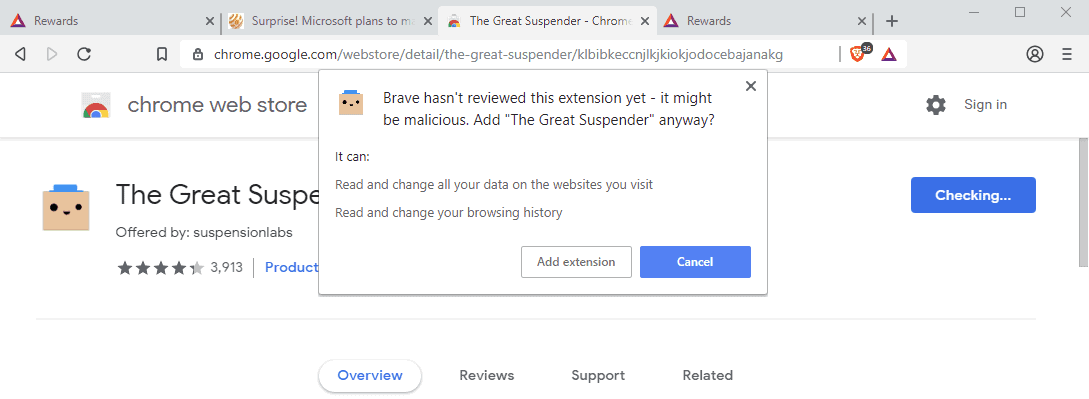Brave: faster loading speed, Chrome extension support

Brave, the ambitious web browser that aims to change website financing and Internet advertising, was switched to Chromium this month.
Brave did use Chromium's rendering engine from the very beginning but it did not use Chromium for its user interface. Company engineers created Muon, a custom "more secure" fork of Electron and used it to power the user interface of the browser.
Brave announced plans to replace Muon with Chromium back in early 2018 and that move has just been completed. The latest Brave browser releases use Chromium for rendering and the user interface.

The development team decided to move to Chromium for a number of reasons including better security and stability.
Switching to the Chromium user interface gives us much more support for Chrome’s features and APIs, as well as Chromium’s stability and its well-supported interface with the core browser engine.
The move frees up development resources and should decrease the time it takes to create new Brave builds and move them to a new Chromium version.
Brave users who used the Muon-powered browser previously may see some design changes, e.g. different tab shapes and colors.
The move to Chromium introduces a number of improvements, e.g. more efficient ad blocking, light and dark theme support, and improved private windows and private windows with Tor.
Brave notes that the move has several advantages: initial benchmarks suggest that load time improved by 22% on average when compared to Muon versions of Brave. Other advantages include support for Chrome extensions that users may install from the Chrome Web Store.
Extensions from the Chrome Web Store
Brave's internal extensions page links to the Chrome Web Store already. Just click on the install link of any extension that is offered at the store to install it.
Brave displays a slightly different prompt than Chrome does though as it warns users that extensions may be malicious if they have not been vetted by Brave.

The prompt displays the permissions that the extension requests next to that as well as options to add the extension to the browser or cancel the deployment.
Performance improvements
Brave's loading performance improved significantly thanks to the move. Desktop users benefit from 22% faster average load times (18% median); load time of some of the sites used in the benchmark improved by up to 34% on the desktop.
Devices with slow connections, comparable to fast 3G connections, may see loading time improvements of up to 44% (median 4%).
No Google phone-home components
Brave engineers removed components from the code that are used to make connections to Google. The team notes that Brave does not make any connections to Google in the background.
The new version of Brave is based on the same Chromium source code as Chrome, but unlike Google’s browser, Brave doesn’t make any connections to Google in the background. We’ve disabled Google Accounts and Sync and removed all the Chrome-specific telemetry and reporting code. Google isn’t used for search suggestions either — Brave relies on an offline Alexa top sites list in addition to your open tabs and history stored only on your device.
Now You: What is your take on Brave? Have you tried the browser recently? (via ZDnet)





















Brave looked interesting. I installed it. Then Comodo Firewall started telling me it was checking for updates. Pretty frequently. Even when it wasn’t running. I disabled the two obvious services. Brave kept going online. Apparently there is no way to turn it off without trickery (ie. messing with hosts file, etc). Here is a link to a discussion I found:
How to stop autoupdate of brave? #1877
https://github.com/brave/browser-laptop/issues/1877
Some browsers let you control them; some want to control you. I understand the idea that they want everyone to have the latest security updates, but that is for me to decide if/when.
Sorry, uninstalling until this changes…
I installed Brave Version 0.65.118 Chromium: 75.0.3770.80 (Official Build) (64-bit) today on latest Microsoft Windows [Version 10.0.18362.175] and like it so far compared to Chrome Version 76.0.3809.25 (Official Build) beta (64-bit). Brave is now my backup browser for Chrome if Chrome has a problem in the future. I may even like Brave better than Chrome after I study the differences more closely.
thebrowser – i see, thank you for explaining this with details to me and everyone.
@Felipe
I’m finding myself reading quite a lot today about Vivaldi to try and be accurate about this. I’ll try to make it as clear as possible: Yes, Vivaldi has open source components, however, it is registered as proprietary software which has closed source components too.
This is clearly stated in Vivaldi’s site where they made the changes made to the Chromium source code and nothing more:
https://help.vivaldi.com/article/is-vivaldi-open-source/
They also state: “Vivaldi also contains third party code”, which if you install the browser can see is a pretty long list by typing this into the address bar: vivaldi://credits
Even the developers of Vivaldi stated clearly that it is not open source:
“I don’t want to say that we are open source, but I just want to say that we are not completely closed source and give some information.”
https://www.reddit.com/r/vivaldibrowser/comments/54kzpc/psa_vivaldi_is_not_open_source_most_of_you/
So yes, Vivaldi has open source components, and yes, Vivaldi is probably (let that be the key word) a perfectly reliable browser in terms of security and perhaps even privacy. But this is quite simply not good enough.
There are plenty of cases of browsers and other tech products from companies of different sizes taking advantage of unaware users by collecting and selling all of their data, sometimes with no real opt-out options. It is very important that our browsers, which are by far the most used piece of software in all our devices to carry out pretty much all of our tasks, to remain transparent and open about how it works.
This year of 2018 should and will be remembered because of the number of massive data leaks and privacy violations from hackers (government and otherwise), incompetent system admins and attempts to modify laws in favor of privacy-unfriendly practices and technologies. Worldwide.
“And for those who dont know vivaldi IS open source:”
From this statement, you obviously knew there may have been some debate or confusion going on in this article. Yet you failed at researching on your own and flat out stated this for everyone to see, when is simply not true, and providing a vague reference to some of the code. This kind of misinformation can be dangerous. I’m not against proprietary software but browsers are at the core of the internet as we know it today, and is worth taking the time to think about what tools do we want to be using in the coming years in regard to our communication, security and privacy.
Thanks for this news Martin, it’s good to know that brave FINALLY supports extensions. It’s also good to know that brave isnt like the other chromes clones out there, that doesnt download/upload data to google. Afaik only QTWebEngines browsers like falkon or otter are like this. :)
And for those who dont know vivaldi IS open source:
https://vivaldi.com/source/
And vivaldi has an IRC chat on #vivaldi at irc.freenode.net i’m there as aztec.
Nice, now I might actually try Brave!
Never understood why Brave and Vivaldi tried to reinvent the UI. I get experimentation and all, but if there’s a hit to performance, I’d rather have performance improvements instead.
I tried Brave before immediately going back to Firefox. If I wanted Chrome with a bad adblocker, I’d use Chrome with Adblock.
“Imagine that: open-source, fully supported browser with high degree of customization – and no telemetry!”
So how would that be different from Vivaldi? What is the case for another browser very similar to Vivaldi?
Note: I do not use Vivaldi myself.
@Klaas Vaak:
“So how would that be different from Vivaldi? What is the case for another browser very similar to Vivaldi?”
Vivaldi is not open source; you can see the changes they’ve made to the Chromium base and for the UI; but what’s under the hood you can’t. I agree with you that other than being open source (which I consider important anyway) there’s not much of a point in making two browsers the same, but if they don’t do this then they’d be just as the big ones are right now so… However they are both in their infancy right now and most likely they will development in different ways. (specially if they are open source).
>> https://help.vivaldi.com/article/is-vivaldi-open-source/
“Another Chrome/Chromium offtake. What are the compelling features that Brave has to offer that Chrome/Chromium and the other forks don’t have?”
Mainly just the ideology of renovating the advertising online and being open source. I personally disregard their ad policy as we have many other options to get rid of those but I still think is a positive thing to do (let’s see where it takes us). On the other hand, chromium based browsers work better on Android so if you want a privacy-friendly Chromium running fast on an Android phone this is a good choice.
Vivaldi isn’t open source.
I guess one way to differentiate these browsers would be to point to the fact that Brave is more privacy oriented. Although that could hardly be considered as something positive, since (at least from my experience) using uBlock yields much better results than using the built-in Brave adblocker.
What stops me from using Vivaldi or Brave is their lagginess. I can’t stand how there’s this tiny, barely noticable delay when switching between tabs (or opening a new one). Brave doesn’t have that, but then there’s the new tab page that you can’t disable and that takes a while to load (a while meaning 500ms+ which is annoying when you often open new tabs).
I’ll be sticking with Firefox for now and keeping my eye out for Min – interesting little project.
> What stops me from using Vivaldi or Brave is their lagginess. I can’t stand how there’s this tiny, barely noticable delay when switching between tabs (or opening a new one). Brave doesn’t have that, but then there’s the new tab page that you can’t disable and that takes a while to load (a while meaning 500ms+ which is annoying when you often open new tabs).
Good to know that it is just not me then. I thought my computer was just getting old because rarely people complain about this sort of thing. I have to Firefox suffers a bit from the same thing, but that shouldn’t be a surprise I guess.
What comes to the Brave’s annoying new tab page, I think the delay entirely thanks to the large photos it loads every time. There’s a Github issue and they plan to make it customizable (hopefully means it can be disabled entirely).
Isn’t Vivaldi closed source?
I really like that they are getting rid of all the telemetry, for me this is already a game changer: a Chromium-based browser that doesn’t phone home and is still well supported.
Being that they are still in the early stages, and with this move the dev’s workload just went down, it would be very nice that they could work on their design to offer something similar as what Vivaldi has. Imagine that: open-source, fully supported browser with high degree of customization – and no telemetry!
I tried it out for a few days and liked it with one major exception- cookie management. I prefer to deny all cookies and whitelist cookies from the individual domains that I need. Brave uses their own “Brave Shields” UI to handle cookie management (tyring to manage them through the Site Information icon to the left of the URL doesn’t work), and I found that certain sites that require cookies are still broken despite being whitelisted in Brave Shields (Gmail is one example). But they’re not even on version 1.0 yet, so I’m definitely keeping my eye on it. Until then I’m sticking with Vivaldi.
I can’t say I’m happy about Google-snooping but suspect changing from Chrome to another browser doesn’t change the score, just the team you are playing against.
Good, because the Muon UI had many broken and unfinished areas (most importantly the bookmark manager was so broken that it was basically unsable).
Unfortunately during this change some Brave-only settings that used be in the preferences are now gone. According to the devs they’re working on bringing some of them back.
The UI is still a bit less “materialistic” than vanilla Chromium/Chrome, which is good.
Looks good. Is there a portable version?
Certainly. Have been using Brave for a couple of years now. I still need to use Firefox on occasion, for content that won’t load.
I’m using it and I absolutely love it. Up to date Chromium with all the Google stuff removed maintained by professionals is exactly what I wanted.
Another Chrome/Chromium offtake. What are the compelling features that Brave has to offer that Chrome/Chromium and the other forks don’t have?
Wondering if one can copy G.chrome settings to Brave:
%LOCALAPPDATA%\Google\Chrome\User Data\
The best browser on the market, IMO. I’m glad that it’s open source.
What a waste.
On the one hand I agree that switching from the Electron framework to Blink has a decent number of advantages – ready-made support of extensions is by far the biggest one – but I think the Brave browser development team has given up one of its unique selling points as well.
Whatever they’re doing now, other browser forks based on the Chrome/Chromium engine Blink have been doing for a longer time. In other words, there’s no need for users to make a switch to Brave now.
Maybe in the future things will look different, but when I look at the development speed of browsers like Opera or Vivaldi, I wouldn’t hold my breath about Brave.
Has anyone uninstalled it? you may be in for a shock..
I’m liking where Brave is going with this
I’m pretty sure that because of Material design included for some time in Chromium, any recipients of that code are faced before two choices – either abandon own modifications and follow up what Google pukes or do as little customization is possible, or work really hard on each major release of own spin-off browser to satisfy what was achieved and what their users like – which is what Vivaldi does with more or less success (some things tend to bug out between releases).
Brave decided to go by the easier path and abandon its customized interface and use what Chromium has to offer; but there’s a good thing about this release – users have finally access to Chrome extensions repository which works way better than Brave-curated own small list. They no longer need to manually recompile browser to include extensions support.
The BraveUpdate.exe component tries to establish connection with addresses from 151.101.*.* pool as aggressively as its Google-counterpart does that with Google servers. As for comparison, Vivaldi updating service sits silent.
It’s good about the same speed to load and run as chrome so beats everything else on my mac. Nice having the option of dark mode, don’t like it system wide but ok in certain apps.
Moving to chromium sorted out the mess was their bookmarking.
Hopefully sync comes back soon. I know they’re testing it, also hope that it sync’s extensions and their settings. The ad blocker’s not as good as ubo but opera’s isn’t either, better than nothing though.
So far it’s my default browser especially as they’re doing a lot of work on privacy rather than fluff which some others seem to prefer.
I was using brave up until they began using chromium. So I uninstalled brave and installed chromium instead. Then installed the ublock origin extension. The way I see it, it’s lighter this way because it doesn’t have any brave features and is bare bones. I don’t need any of the features in brave, I was using it mainly because it was competition to Chrome. Since they jumped onto the chromium bandwagon, I went ahead and made the switch. Edge is also planning on making a similar move to chromium backend.
I’d use Chromium too if it wasn’t for the update mechanism.
What? You don’t compile Chromium? All those cores and memory bandwidth just wasted on browsing the internet
They’ve always been based on chromium deep down, did you think they wrote their own engine? It’s just they way they’re doing it is different as the wrapper they used to use was too much effort for not much reward.
Until they release version 1.0 for me everything is simply a proof-of-concept. Hope they gonna redesign the UI.